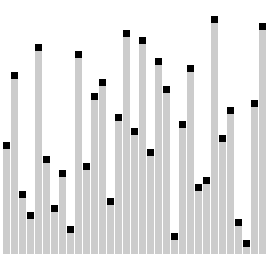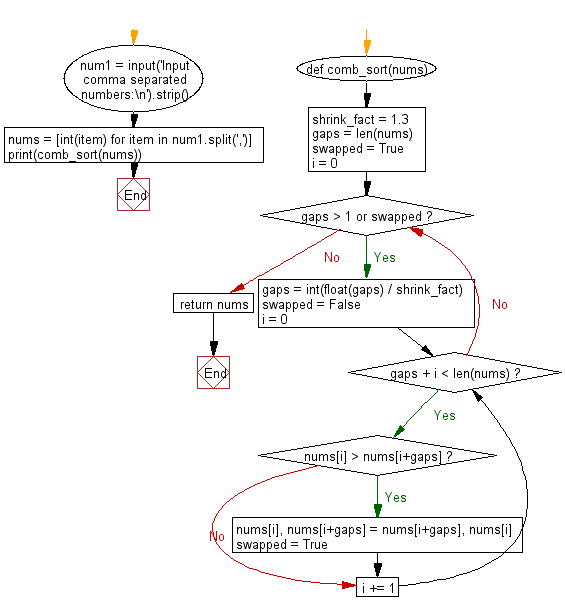Python: Sort a list of elements using Comb sort
15. Comb Sort
Write a Python program to sort a list of elements using Comb sort.
The Comb Sort is a variant of the Bubble Sort. Like the Shell sort, the Comb Sort increases the gap used in comparisons and exchanges. Some implementations use the insertion sort once the gap is less than a certain amount. The basic idea is to eliminate turtles, or small values near the end of the list, since in a bubble sort these slow the sorting down tremendously. Rabbits, large values around the beginning of the list do not pose a problem in bubble sort.
In bubble sort, when any two elements are compared, they always have a gap of 1. The basic idea of comb sort is that the gap can be much more than 1.
Visualization of comb sort:

Animation credits : Jerejesse
Sample Solution:
Python Code:
def comb_sort(nums):
shrink_fact = 1.3
gaps = len(nums)
swapped = True
i = 0
while gaps > 1 or swapped:
gaps = int(float(gaps) / shrink_fact)
swapped = False
i = 0
while gaps + i < len(nums):
if nums[i] > nums[i+gaps]:
nums[i], nums[i+gaps] = nums[i+gaps], nums[i]
swapped = True
i += 1
return nums
num1 = input('Input comma separated numbers:\n').strip()
nums = [int(item) for item in num1.split(',')]
print(comb_sort(nums))
Sample Output:
Input comma separated numbers: 5, 15, 37, 25, 79 [5, 15, 25, 37, 79]
Flowchart:

For more Practice: Solve these Related Problems:
- Write a Python program to implement comb sort and print the gap values used at each iteration.
- Write a Python script to sort a list using comb sort and compare its efficiency with bubble sort for large inputs.
- Write a Python program to implement comb sort and count the number of swaps required to sort a list.
- Write a Python function to perform comb sort on a list of integers and output both the sorted list and the final gap value.
Previous: Write a Python program to sort a list of elements using Cocktail shaker sort.
Next: Write a Python program to sort a list of elements using Cycle sort.
Python Code Editor:
Contribute your code and comments through Disqus.
What is the difficulty level of this exercise?
Test your Programming skills with w3resource's quiz.
